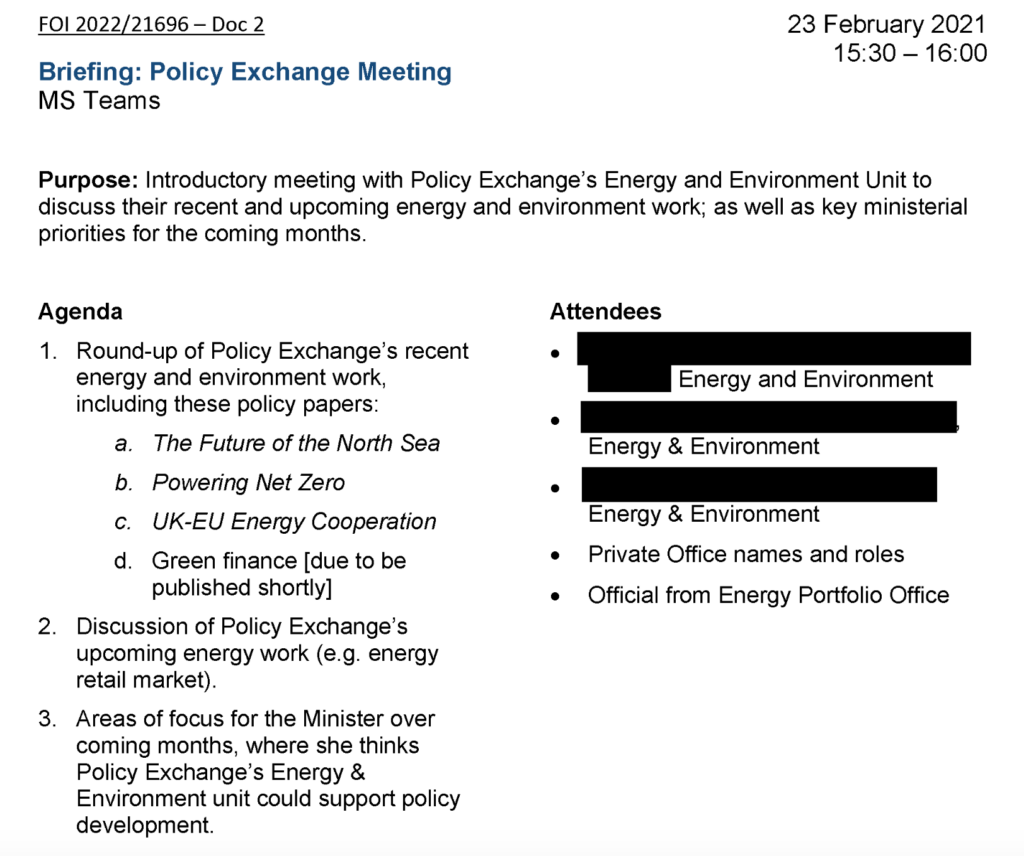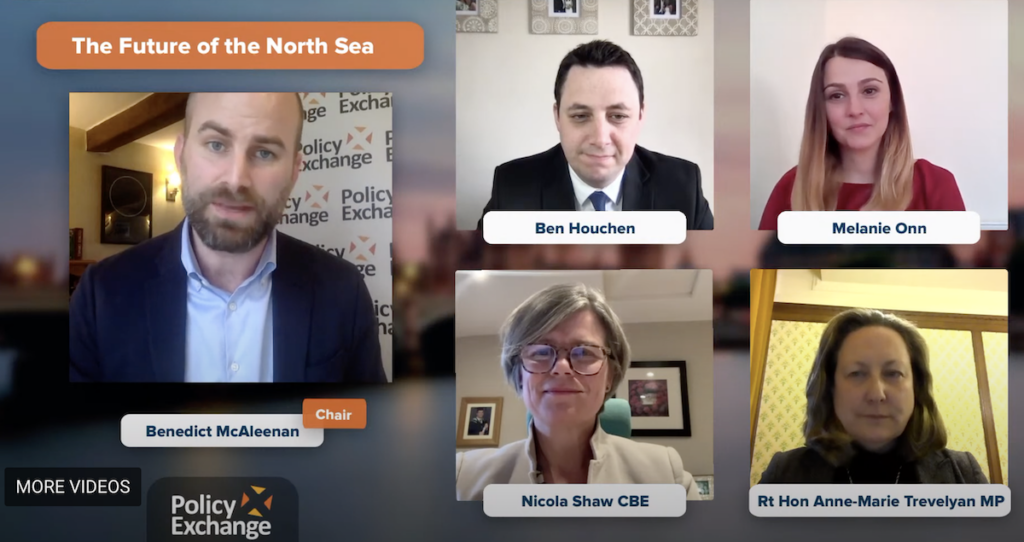Policy Exchange, one of Westminster’s most prominent think tanks, engaged in a high-level influencing campaign over the UK’s North Sea oil and gas policies while being funded by fossil fuel interests, DeSmog can reveal.
The North Sea Transition Deal announced by the government in March 2021 set a net zero target for the basin but allowed for the continued exploration of oil and gas.
The Transition Deal echoed the fossil fuel lobby by emphasising the importance of hydrogen power and carbon capture utilisation and storage (CCUS) to the green transition.
These were the policies presented to senior ministers by Policy Exchange during the drafting of the deal, through a report “generously supported” by a firm with major financial interests in the gas industry and the deployment of hydrogen.
The government on Monday announced that it plans on awarding hundreds of new North Sea oil and gas exploration licences, beginning this autumn, with Energy and Net Zero Secretary Grant Shapps recently declaring that he wants to “max out” the UK’s North Sea oil and gas reserves.
The International Energy Agency has stated that new oil and gas exploration is incompatible with net zero.
Prime Minister Rishi Sunak also confirmed the location of two new CCUS sites, re-committing the government to its £20 billion planned investment in the technology, which in theory involves harnessing the CO2 produced from burning fossil fuels.
Sunak recently credited Policy Exchange with “helping us draft” the government’s crackdown on protests – policies which saw more than 2,000 people arrested from the climate activist group Just Stop Oil in the year to April 2023. Policy Exchange received $30,000 from the oil and gas supermajor ExxonMobil in 2017.
Tessa Khan, executive director of the environmental non-profit Uplift, called the North Sea Transition Deal “a sham drawn up by fossil fuel lobbyists to delay any meaningful action to actually move the UK off fossil fuels.”
Policy Exchange did not respond to our requests for comment.
The Ministerial Meeting
DeSmog has obtained the details of a meeting held on 23 February 2021 between Policy Exchange’s Energy and Environment Unit and Anne-Marie Trevelyan, who at the time was serving as Minister for Energy, Clean Growth and Climate Change at the Department of Business, Energy and Industrial Strategy (BEIS).
According to the meeting’s agenda, Policy Exchange briefed Trevelyan on its recent reports, including a November 2020 report entitled “The Future of the North Sea”, which recommended redeploying oil and gas industry assets for the development of hydrogen and CCUS.
To meet the UK’s net zero targets, “offshore wind will need to grow alongside investment in low-carbon hydrogen and CCUS, which the North Sea is… central to developing,” the report stated.
Trevelyan’s office briefed the minister that “The Future of the North Sea” report “rightly acknowledges opportunities for the oil and gas sector to support the energy transition”, and that “the UK’s offshore oil and gas assets have the potential to be reused and repurposed for CCUS projects.”
The officials encouraged Trevelyan to ask the “thoughts” of Policy Exchange on the “role that CCUS can play in helping us achieve net zero”.

This was reflected in the March 2021 North Sea Transition Deal, which said that the UK should be “harnessing the power of the oil and gas sector and anchoring it to the UK for the energy transition”. It added that, “Hydrogen is essential to meeting our net zero commitment in the UK.”
Fossil fuel firms tout CCUS and hydrogen as green energy solutions, yet the reality is more complicated.
Producing hydrogen is relatively inefficient, with the UN‘s Intergovernmental Panel on Climate Change (IPCC) estimating that hydrogen will represent at best 2.1 percent of total worldwide energy consumption in 2050, while it is currently largely produced using fossil fuels.
According to Simon Roberts, Honorary Professor at Brunel University’s Resource Efficient Future Cities Research Centre, “Hydrogen should only be considered where there is no alternative. For example, long distance, heavy transport, such as ships, large planes and some trucks.”
Environmental groups and climate scientists have also raised concerns that CCUS offers a “false solution” that is unproven at scale and which may not effectively or safely store carbon.
Critics also point out that CCUS involves storing the carbon produced by fossil fuels rather than switching to renewable energy sources, thus permitting polluters to keep profiting from oil and gas exploration.
These fears are reinforced by the fact that building CCUS facilities and producing hydrogen are most easily achieved by using existing fossil fuel infrastructure.
Shell executive Simon Roddy has been appointed as the co-chair of the North Sea Transition Steering Group – the regulator in charge of monitoring the North Sea industry’s shift away from oil and gas.
The government demanded “next to nothing of North Sea oil and gas firms” through the Transition Deal, said Khan. “Instead, the deal focuses on hydrogen and carbon capture technologies, both of which would protect industry profits but do nothing to fix the UK’s broken energy system. This is not the path to cheaper, cleaner energy.”
The Future of the North Sea
According to Policy Exchange, “The Future of the North Sea” report was developed with “generous support” from the National Grid – one of the UK’s leading gas suppliers.
National Grid “owns and operates” the national gas network – via National Grid Gas – while maintaining and managing around 7 million domestic, industrial and commercial gas assets across the UK.
At the time of the report’s release, National Grid fully owned National Grid Gas, which logged revenues in excess of £1.3 billion in 2021/22.
In March 2022, National Grid announced that it had agreed to sell 60 percent of National Grid Gas to Macquarie Asset Management and British Columbia Investment Management Corporation (BCI) for over £4 billion, initially retaining a 40 percent share – a sale directly linked to the company’s potential to exploit the hydrogen market.
In a press release about the sale, Macquarie executive Martin Bradley pledged that National Grid Gas would “support the expansion of hydrogen’s role in the energy mix to deliver a competitive edge to the UK and its industry, while working closely with the government and Ofgem to maintain security of supply.”
In July this year, Macquarie and BCI purchased a further 20 percent stake in National Grid Gas.
Even prior to this sale, National Grid Gas was repurposing many of its gas assets for hydrogen, with its 2020/21 accounts stating that it was working “with industry peers to support the transition to a hydrogen network.” The accounts list FutureGrid as one of these projects, a multi-million-pound hydrogen testing facility in Cumbria.
Benedict McAleenan, one of the co-authors of “The Future of the North Sea” report, is an energy lobbyist. McAleenan is a senior fellow (formerly a “senior adviser”) at Policy Exchange on energy and the environment, while also running the consultancy Helmsley Energy, which he founded in 2016. The Helmsley website says that it provides “communications, government relations, thought leadership and political risk to companies on the front line of the energy transition.”
“The Future of the North Sea” report acknowledged that McAleenan was working for Helmsley and that he had in the past advised the National Grid, Centrica (the parent company of British Gas), and Shell – among others. DeSmog understands that he advised these companies prior to joining Policy Exchange and founding Helmsley Energy.
Helmsley was listed on the UK’s register of consultant lobbyists as of April 2021. In the period from October to December 2021, a number of firms were added to Helmsley’s roster, including Drax, the UK’s largest emitter of CO2, which continues to be listed in the latest release of Helmsley’s clients, from April to June 2023.
Helmsley claims on its website that it has worked on projects advocating for a reduced reliance on fossil fuels, including the proposed phaseout of new petrol and diesel vehicles by 2030, and supporting policies that ensure a “renewables-led energy mix”.
Government records published on 21 July listed a dinner held between Helmsley Energy and Grant Shapps on 6 February 2023. This record now appears to have been deleted.
Benedict McAleenan and National Grid declined to comment on the record.
The Event
On 11 March 2021, a couple of weeks after Policy Exchange met with Trevelyan and 10 days before the release of the North Sea Transition Deal, Policy Exchange hosted an event on the future of the North Sea, chaired by McAleenan and attended by Trevelyan, Nicola Shaw of the National Grid, the Conservative Tees Valley Mayor Ben Houchen, and Melanie Onn of Renewable UK.
Opening his remarks, Houchen commented on the good timing of the event, saying: “It’s as if you [Policy Exchange] knew what was going to happen before we even knew it was going to happen.”
Trevelyan and Houchen used the event to advocate for adapting North Sea fossil fuel assets to hydrogen and CCUS.
“The UK’s offshore oil and gas assets have the potential to be reused and repurposed for CCUS projects and our initial review has helped to identify those opportunities,” Trevelyan said, with Houchen adding that “CCUS is going to play a really key role in the transition away from oil and gas.”
The Tees Valley Mayor further claimed there are “fantastic opportunities” associated with hydrogen production – pointing out that Teesside generates over 50 percent of the country’s hydrogen.

Fossil Fuel Interests
Policy Exchange also has links to gas industry members advocating for the transition to hydrogen.
In a blog post written in 2020, the think tank claimed that it had been a “leading voice for hydrogen” – citing its 2018 “Fuelling the Future” report.
According to the article, this 2018 paper “made the case for hydrogen as an important component of a zero-carbon economy, saying that it could play a key role in decarbonising industry… It argued strongly for the use of industrial hubs and increasingly ambitious pilot projects to help develop the technologies and deploy them commercially – all of which has been adopted.”
One of Europe’s “leading gas companies”, Uniper – which has considerable hydrogen assets including the development of a “blue” hydrogen facility with Shell in the UK – provided “generous support” for the “Fuelling the Future” report, alongside the Energy and Utilities Alliance, which represents gas companies and has lobbied for the widespread deployment of hydrogen.
More recently, Policy Exchange hosted events at both the 2022 Labour and Conservative conferences sponsored by the Hydrogen UK trade body (of which National Grid is a member), featuring ministers and MPs.
Policy Exchange has also accepted funding from fossil fuel interests.
In 2017, the oil and gas giant ExxonMobil donated $30,000 to the American Friends of Policy Exchange – the US campaigning wing of Policy Exchange, which provides financing to the UK operation. Two years later, Policy Exchange published a report entitled “Extremism Rebellion”, in which it called for the police and the government to clamp down on eco protests.
These policies have since been enacted, and Prime Minister Rishi Sunak noted in a speech at Policy Exchange’s 2023 summer party that the think tank had “helped us draft” the government’s crackdown on protests.
According to VICE, Policy Exchange has hosted events at the Conservative Party conference since 2016 sponsored by energy companies and trade groups including: Drax, E.on, Centrica, the Energy Networks Association, Cadent Gas, Hydrogen UK, and the Sizewell C nuclear plant.
“The think tank does not advertise the cost of sponsored meetings at party conferences,” VICE notes, “but other similar organisations charge over £12,000 to hold these events, which only last about an hour a half.”
Policy Exchange was co-founded in 2002 by Michael Gove, who has been a mainstay in the Cabinet since 2010, and the think tank continues to retain vast influence in Westminster. At the 2022 Conservative Party conference, Jacob Rees-Mogg, at the time serving as Business, Energy and Industrial Strategy Secretary, said: “I believe that where Policy Exchange leads, governments have often followed.”
Policy Exchange alumni make up a greater number of special advisers in Rishi Sunak’s government than any other think tank, while Rishi Sunak himself worked as the head of Policy Exchange’s black and minority ethnic (BME) research unit prior to his election to Parliament in 2015.
Lord Frost is currently a senior fellow at Policy Exchange, having also recently become a trustee of the Global Warming Policy Foundation (GWPF) – the UK’s principal climate science denial group.
Meanwhile, the chair of the Policy Exchange board is Alexander Downer, who served as Australia’s Foreign Minister from 1996 to 2007. Downer was appointed as the High Commissioner to the UK in 2014 by Tony Abbott, who also recently joined the board of the GWPF.
Downer has expressed climate science scepticism in the past, claiming that we are “going through an era” of global warming, and saying that Australian climate leadership would be expensive “virtue signalling”.
Subscribe to our newsletter
Stay up to date with DeSmog news and alerts







